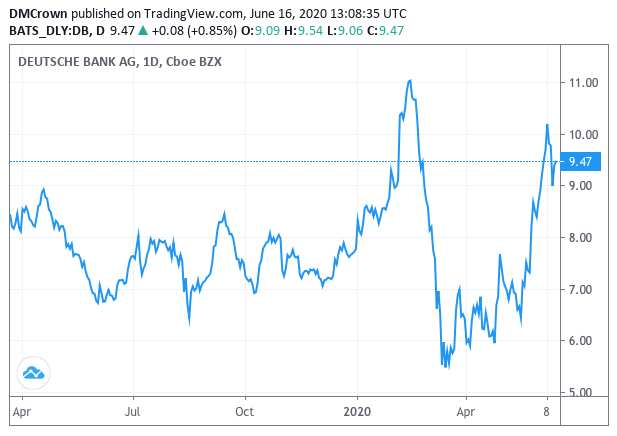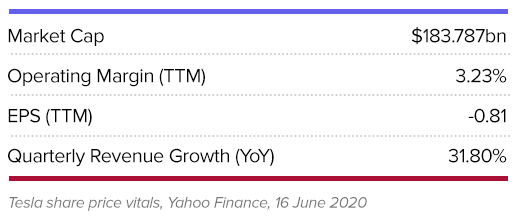

In stark contrast to the performance of its high-spec, high-performance electric cars, Tesla’s [TSLA] share price has had a bumpy ride in 2020.
The share price accelerated to a record high in February, closing above $900 for the first time – a meteoric rise when you consider that it was trading below $300 for the majority of 2019. However, the coronavirus pandemic put the brakes on Tesla’s share price gains and the stock plummeted to $361 on 18 March. But Tesla’s share price has kicked back into high gear with investors asking just how far it can go.


Telsa’s share price soars past $1,000 level
Since those lows in March, Tesla’s share price has jumped over 250%, clawing back all of the ground it lost during the Covid-19 related sell-off. Wednesday 10 June saw Tesla's share price soar past the $1,000 mark to reach a new all-time high at $1,025, after CEO Elon Musk revealed plans to move forward with production of its Semi truck, an electric pickup vehicle dubbed ‘Cybertruck’.
Tesla’s share price slipped back below the $1,000 level the following day, but its valuation had pushed up to around $190bn, to close in on Toyota, the world’s number one vehicle manufacturer.
What’s next for Tesla’s share price?
At the end of April following its Q1 update, CMC Markets’ analyst David Madden remarked: “The Tesla share price has been driving higher for over a month now, and while it holds above the $700 mark, the bullish trend should continue.”
So, what comes next? Well, according to the billionaire investor, Ron Baron, more of the same. In fact, he believes Tesla’s share price has considerable upward scope yet. In an interview with CNBC, Baron predicted that Tesla’s share price will “be $2,000 or $3,000 in 5 years and a multiple of that over the next 5 years”.


Further positivity was in evidence last week from Wedbush Securities analyst, Dan Ives. In his bullish appraisal, he said demand for Tesla’s Model 3 car in China, plus upcoming potential battery-life improvements, meant the Tesla share price has “room to run further”.
As a result, Ives pushed his share price target up to $1,000, from $800, with an improved high-rate target of $1,500. Ives reckons the Chinese market has huge potential, and that the Shanghai Gigafactory will reach production output of 100,000 vehicles within its first year.
Musk’s so-called ‘Battery Day’ event – which has been delayed due to the coronavirus outbreak - will detail the improved technology and the breakthroughs made in the firm’s lithium-ion battery production, which should mean Tesla’s cars can run for far longer, as well as cutting costs.


Time to buy Tesla’s share price?
However, GLJ research analyst Gordon Johnson urges caution, making the point that the China car sales figure for May was only an estimate. It’s still unknown exactly how many of its Model 3 cars Tesla actually sold last month.
Johnson went on to say that Tesla’s EU sales numbers “were pretty bad”, and therefore rates Tesla a Sell. Analysts seem split on where next for Tesla’s share price. Of the 34 tracking the stock on the Financial Times, 22 rate it either a Hold or Underperform. And with an average share price target of $650, the overriding view is that Tesla’s share price will fall by 34% in the next year. Whichever way Tesla’s share price moves in the next 12 months, you should probably buckle up for the ride.


Source: This content has been produced by Opto trading intelligence for Century Financial and was originally published on cmcmarkets.com/en-gb/opto
Disclaimer: Past performance is not a reliable indicator of future results.
The material (whether or not it states any opinions) is for general information purposes only and does not take into account your personal circumstances or objectives. Nothing in this material is (or should be considered to be) financial, investment or other advice on which reliance should be placed. No opinion given in the material constitutes a recommendation by Century Financial or the author that any particular investment, security, transaction or investment strategy is suitable for any specific person.
Century Financial does not endorse or offer opinion on the trading strategies used by the author. Their trading strategies do not guarantee any return and Century Financial shall not be held responsible for any loss that you may incur, either directly or indirectly, arising from any investment based on any information contained herein.
















